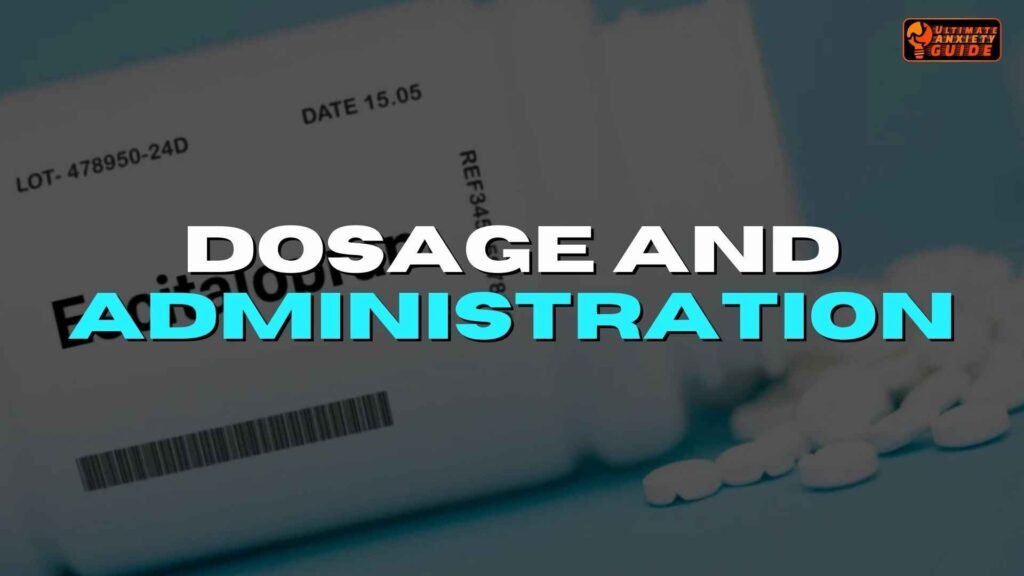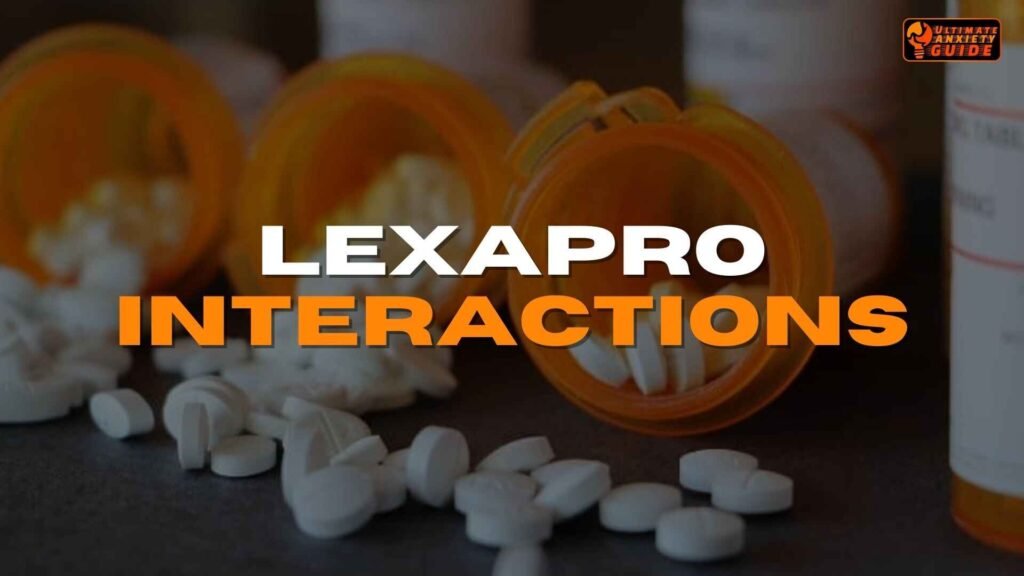Are you struggling with weight gain while taking Lexapro? If so, you’re not alone. Many people experience this side effect. Let us find out 10 effective strategies to tackle Lexapro weight gain and take control of your health.
So, lemme start with the basics: What exactly is Lexapro, and why might it cause weight gain? Alright! Lexapro (escitalopram) is a popular medication that helps to treat depression and anxiety by balancing chemicals in the brain. While it’s effective for mental health, it can sometimes lead to weight gain. This happens because Lexapro may influence your appetite or metabolism, which can lead to weight gain.
Okay, now, without further ado, let’s dig into all the details. Are you pretty much excited to learn more? Alright! Let’s get started!
What is Lexapro weight gain?

Lexapro (escitalopram) is a type of selective serotonin reuptake inhibitor (SSRI) commonly prescribed to treat depression and anxiety. Lexapro weight gain can be a potential side effect, although it’s not experienced by everyone.
So, why does Lexapro sometimes lead to weight gain? It’s not entirely clear, but a few things might be at play. For some people, Lexapro weight gain can result from increased appetite or cravings, which may lead to eating more frequently. Others might experience changes in metabolism or energy levels, which can also contribute to weight gain. On the other hand, feeling better emotionally can lead to a more active lifestyle, which might help balance things out.
10 Incredible Tactics to Combat Lexapro Weight Gain

1. Implement a Balanced Diet to Manage Lexapro Weight Gain
Managing Lexapro weight gain starts with a balanced diet. It’s not just about reducing calories—it’s about making sure you’re fueling your body with the right nutrients.
Focus on Nutrient-Dense Foods:
- Fruits and Vegetables: Aim for a rainbow of fruits and veggies on your plate. They’re packed with vitamins, minerals, and fiber, which can help manage Lexapro weight gain.
- Whole Grains: Switch to whole grains like brown rice, quinoa, and oats. They’re more filling and have more nutrients compared to refined grains.
Tips for Portion Control:
- Mindful Eating: Pay attention to your body’s signals of hunger and fullness. Eating when you’re genuinely hungry and stopping when you’re satisfied can help prevent overeating associated with Lexapro weight gain.
- Healthy Choices: Minimize high-calorie, low-nutrient foods like sugary snacks and processed items. Opt for whole, unprocessed foods instead.
Healthy Meal Planning and Snack Options:
- Breakfast: Greek yogurt with sliced bananas and a dash of pumpkin seeds is a great start. It’s packed with protein and healthy fats that keep you full longer.
- Lunch: Try a quinoa salad with mixed vegetables and a lean protein source such as chicken or lentils. It’s balanced and filling.
- Snack: Apple slices with almond butter or a handful of nuts can satisfy hunger without adding too many calories.
By adopting a balanced diet, you’ll be in a better position to manage Lexapro weight gain and promote overall well-being.
2. Increase Physical Activity to Combat Lexapro Weight Gain
Regular exercise is key to managing Lexapro weight gain. It not only burns calories but also boosts your mood, which can help counteract some of the Lexapro weight gain effects.
Recommended Types and Amounts of Exercise:
- Aerobic Exercise: Aim for at least 150 minutes of activities like brisk walking, running, or cycling each week. It’s effective in managing Lexapro weight gain.
- Strength Training: Adopt weight lifting or strength training exercises two to three times a week. Building muscle can help increase your metabolism and support weight management.
Tips for Incorporating More Movement:
- Daily Routines: Small changes like taking the stairs or walking during your lunch break can add up and help manage Lexapro weight gain.
- Find Enjoyable Activities: Choose exercises you enjoy—whether it’s dancing, swimming, or playing a sport. Enjoyment can make it easier to stick with your routine.
Regular exercise supports healthy metabolism and enhances overall well-being, making it a crucial component in managing Lexapro weight gain.
3. Stay Hydrated to Support Weight Management
Staying hydrated is essential in managing Lexapro weight gain. Proper hydration helps control appetite and supports a healthy metabolism.
Strategies to Increase Water Intake:
- Set Reminders: Use apps or alarms to remind yourself to drink water throughout the day. Staying on top of your hydration can help manage Lexapro weight gain.
- Carry a Water Bottle: Keep a reusable water bottle with you at all times. It’s a simple way to ensure you’re drinking enough water.
Benefits of Hydration:
- Appetite Control: Drinking water before meals can make you feel fuller, which might help reduce overall calorie intake related to Lexapro weight gain.
- Overall Health: Proper hydration supports numerous bodily functions and can boost your energy levels, helping you stay active and focused.
Hydration is a simple yet powerful tool in managing Lexapro weight gain and overall health.
4. Monitor Your Weight and Eating Habits
Tracking your weight and eating habits is crucial in managing Lexapro weight gain. It helps you identify patterns and triggers for overeating.
Keeping a Food Diary or Using a Tracking App:
- Food Diary: Record your meals, snacks, and drinks. This can give you insights into your eating patterns and how they relate to Lexapro weight gain.
- Tracking Apps: Use apps to monitor your calorie intake and physical activity. They can help you stay on track with your weight management goals.
Identifying Patterns and Triggers:
- Overeating Triggers: Notice if certain situations or emotions lead to overeating. Addressing these triggers can help manage Lexapro weight gain.
- Adjusting Habits:Make adjustments to your diet and exercise routine based on your observations. This attentive approach helps you stay on top of your weight management.
Regular monitoring helps you stay informed and make necessary adjustments to manage Lexapro weight gain effectively.
5. Manage Stress Effectively to Reduce Lexapro Weight Gain
Stress can contribute to Lexapro weight gain by leading to emotional eating or cravings. Effective stress management is crucial for maintaining a healthy weight.
Techniques for Stress Reduction:
- Mindfulness: Practice mindfulness or meditation to calm your mind and reduce stress. This can help prevent stress-related eating associated with Lexapro weight gain.
- Yoga: Add yoga to your routine to enhance relaxation and physical well-being. It’s a great way to manage stress and support weight management.
- Deep Breathing: Engage in deep breathing exercises to help relax your body and mind, decreasing the chance of stress-related eating.
Seeking Professional Help:
- Therapy: If stress becomes overwhelming, consider talking to a therapist or counselor. Professional support can be beneficial in managing stress and Lexapro weight gain.
Managing stress effectively reduces emotional eating and supports a healthier lifestyle, aiding in the management of Lexapro weight gain.
6. Prioritize Sleep for Weight Management
Good sleep is essential for managing Lexapro weight gain. It affects your metabolism and overall health.
Tips for Improving Sleep Quality:
- Establish a Routine: Go to bed and wake up at the same time each day to regulate your sleep patterns. Consistent sleep helps to manage Lexapro weight gain.
- Create a Restful Environment: Keep your bedroom cool, dark, and quiet to enhance sleep quality. A good night’s sleep supports weight management and overall health.
The Link Between Sleep and Health:
- Metabolism: Quality sleep supports a healthy metabolism, which can help manage Lexapro weight gain.
- Overall Health: Good sleep is essential for both mental and physical health, contributing to effective weight management.
Prioritizing sleep is a key factor in managing Lexapro weight gain and supporting overall well-being.
7. Adopt Healthy Eating Habits
Healthy eating habits are essential in managing Lexapro weight gain. They help to maintain a balanced diet and prevent overeating.
Eating Mindfully:
- Understand Hunger Cues: Eat when you’re genuinely hungry and stop when you’re satisfied, not when you’re full. This helps manage Lexapro weight gain.
- Avoid Overeating: Practice portion control and try not to eat in response to emotions. Mindful eating can help prevent excessive eating.
Strategies to Avoid Emotional Eating:
- Regular Meal Times: Stick to regular meal times to maintain balanced energy levels and reduce the chance of overeating.
- Balanced Meals: Include a mix of proteins, carbohydrates, and fats in your meals for effective nutrition and to help manage Lexapro weight gain.
Adopting these healthy eating habits supports effective management of Lexapro weight gain and overall health.
8. Seek Support from a Nutritionist or Dietitian
Professional guidance can be crucial in managing Lexapro weight gain. A nutritionist or dietitian can help you create a tailored plan to meet your specific needs.
Benefits of Professional Guidance:
- Customized Plan: A nutritionist or dietitian can develop a personalized plan based on your dietary needs and weight management goals related to Lexapro weight gain.
- Expert Advice: Receive expert advice on managing weight while on Lexapro, including tips for balanced eating and effective strategies.
Finding and Working with a Qualified Professional:
- Credentials: Look for a licensed nutritionist or dietitian with experience in handling medication-related weight gain.
- Consultations: Schedule regular consultations to track progress and make necessary adjustments to your plan.
Professional support provides the expertise needed to effectively manage Lexapro weight gain.
9. Explore Complementary Therapies
Complementary therapies can offer additional support in managing Lexapro weight gain. Consult with your healthcare provider before trying any new therapies to ensure they are safe and effective.
Potential Benefits of Complementary Approaches:
- Acupuncture: Some studies suggest that acupuncture may help with weight management and appetite control, potentially assisting in managing Lexapro weight gain.
- Herbal Supplements: Certain herbs might support metabolism or reduce cravings. Always consult with your doctor before using any herbal supplements to ensure they’re safe and won’t interact with Lexapro.
Consulting with Healthcare Providers:
- Safety: Ensure that any complementary therapies are safe and won’t interact with Lexapro.
- Evidence-Based: Choose therapies supported by evidence and discuss them with your healthcare provider.
Complementary therapies can be a supplementary approach to managing Lexapro weight gain when used alongside traditional strategies.
10. Stay Positive and Patient
Managing Lexapro weight gain requires a positive mindset and patience. Weight management is a gradual process, and maintaining a positive outlook is crucial.
Importance of a Positive Mindset:
- Encouragement: Celebrate small victories and progress, no matter how minor they may seem. A positive mindset helps in managing Lexapro weight gain.
- Persistence: Understand that weight management takes time and consistent effort. Stay patient and persistent in your efforts.
Staying Committed:
- Set Realistic Goals: Set achievable goals and stay committed to your weight management plan.
- Support Systems: Engage with support groups or communities to share experiences and gain motivation. Support from others can make managing Lexapro weight gain easier.
Staying positive and patient helps you navigate the challenges of Lexapro weight gain and maintain a healthier lifestyle.
10 Common Side Effects of Lexapro

If you’re taking Lexapro and noticing some changes in your body or mood, you’re not alone. It’s common to experience side effects, especially when you first start the medication. One common concern people have is Lexapro weight gain, but there are other side effects to be aware of as well.
- Nausea: Feeling a bit nauseous? This is common when starting Lexapro. Eating smaller, more frequent meals and staying hydrated can help ease this side effect.
- Insomnia: Struggling with sleep? Lexapro can sometimes interfere with your rest. Establishing a calming bedtime routine and sticking to a regular sleep schedule may improve your sleep quality.
- Fatigue: Feeling unusually tired or lethargic is another possible side effect. Try to rest when needed and gradually increase your activity level to combat fatigue.
- Dry Mouth: A dry mouth can be uncomfortable but manageable. Drinking water regularly, chewing sugar-free gum, or using a saliva substitute can provide relief.
- Dizziness: If you’re feeling dizzy or lightheaded, especially when standing up quickly, take it slow and be cautious with sudden movements.
- Sweating: Increased sweating, particularly at night, can occur. Wearing light, breathable clothing and staying in a cool environment can help you stay comfortable.
- Sexual Dysfunction: Changes in sexual drive or performance can be challenging. It’s important to discuss these issues with your doctor to find the best way to address them.
- Appetite Changes: Along with potential Lexapro weight gain, you might notice changes in your appetite. Pay attention to your eating habits and try to maintain a balanced diet.
- Tremors: Mild tremors or shaking can occur. If this becomes bothersome, consult with your healthcare provider for guidance on how to manage this side effect.
- Weight Changes: Apart from Lexapro weight gain, some people might experience weight loss. Keep track of any significant changes in your weight and discuss them with your doctor.
10 Tips to Manage Lexapro Side Effects
Managing the side effects of Lexapro (escitalopram) can make a significant difference in your overall experience with the medication. Here are ten practical tips to help you manage common side effects effectively:

1. Hydration for Dry Mouth: Drinking plenty of water throughout the day helps to maintain hydration and can reduce the dry mouth often associated with Lexapro. Carrying a water bottle ensures that you always have access to fluids and can sip regularly, which helps keep your mouth moist. Managing Lexapro weight gain might also benefit from staying hydrated as it helps overall well-being.
To further combat dry mouth, consider using sugar-free gum or lozenges. These not only stimulate saliva production but also provide a refreshing taste. Choosing products that are sugar-free is important to avoid contributing to dental problems, especially if you are managing Lexapro weight gain and dry mouth.
2. Strategies for Insomnia: Establishing a regular sleep routine is crucial for managing insomnia, which can be intensified by Lexapro. Going to bed and waking up at the same time each day helps regulate your internal clock, making it easier to fall asleep and stay asleep. Consistency is key, particularly when dealing with Lexapro weight gain and its impact on your sleep patterns.
Creating a restful sleep environment enhances sleep quality. Keep your bedroom dark by using light-blocking curtains or an eye mask, cool with a fan or air conditioning, and quiet by using earplugs or a white noise machine. Limiting exposure to screens (phones, tablets, computers) and avoiding caffeine in the hours leading up to bedtime also contribute to better sleep, which is important when managing Lexapro-related weight gain and insomnia.
3. Dealing with Nausea: Taking Lexapro with food can help reduce the likelihood of nausea. The presence of food in your stomach helps buffer the medication, which may reduce gastrointestinal discomfort. Eating smaller, more frequent meals throughout the day can also prevent nausea and keep your stomach settled, especially when trying to manage Lexapro weight gain.
Ginger is well-known for its anti-nausea properties. Drinking ginger tea or consuming ginger candies might offer relief. However, it’s important to consult with your healthcare provider before adding any new remedies to your routine to ensure they are safe and appropriate for you, particularly if you’re managing nausea related to Lexapro weight gain.
4. Managing Fatigue: Balancing activity with rest can help manage fatigue, which can be a side effect of Lexapro. Adopting short, frequent breaks into your workday and engaging in light physical activity, such as walking, can help maintain your energy levels. Finding a rhythm between activity and rest is crucial when addressing Lexapro weight gain and its impact on your overall energy.
Ensure you’re getting quality sleep by maintaining good sleep hygiene practices. If fatigue persists despite making lifestyle adjustments, it’s important to discuss this with your healthcare provider. Persistent fatigue might be related to Lexapro or other contributing factors that need to be addressed, including any potential impact on weight gain.
5. Addressing Dizziness: To manage dizziness, it’s helpful to stand up slowly from sitting or lying positions. This reduces the risk of a sudden drop in blood pressure that can cause lightheadedness or dizziness, which can be worsened by Lexapro. Being mindful of this is important when managing Lexapro weight gain and its associated side effects.
Avoiding sudden movements and ensuring adequate hydration can also help prevent dizziness. Dehydration can intensify dizziness, so drinking enough fluids throughout the day is essential. If dizziness is a frequent problem, consulting with your healthcare provider is important, especially if it affects your ability to manage Lexapro weight gain.
6. Handling Sweating: Wearing breathable, moisture-wicking clothing can help manage excessive sweating by allowing sweat to evaporate more effectively and keeping you comfortable. Choosing fabrics like cotton or technical sportswear can be beneficial, particularly if you’re experiencing sweating as a side effect of Lexapro and its potential impact on your weight.
Using strong antiperspirants can also help control sweating. Maintaining good personal hygiene, including regular showers and wearing clean clothes, helps to manage the effects of sweating and keeps you feeling fresh throughout the day, especially when dealing with Lexapro weight gain.
7. Managing Sexual Dysfunction: Sexual side effects are a common concern with Lexapro. It’s important to discuss these issues with your healthcare provider. They may adjust your dosage, switch you to a different medication, or suggest additional treatments to address these effects, which can also include managing Lexapro weight gain.
Open communication with your partner can alleviate some of the emotional stress associated with sexual dysfunction. Understanding and support from your partner can help manage any feelings of frustration or disappointment and improve your overall relationship, which is important when dealing with Lexapro weight gain.
8. Controlling Appetite Changes: Monitoring your eating habits can help manage appetite changes related to Lexapro. Keeping a food diary to track what you eat and when can help you identify patterns and make healthier choices. Being mindful of your diet helps to maintain balance and prevent unwanted weight gain, which can be a concern with Lexapro.
If you experience significant appetite changes, consulting with a nutritionist can provide personalized advice. A nutritionist can help create a balanced meal plan that aligns with your needs while on Lexapro, addressing both nutritional requirements and appetite concerns related to Lexapro weight gain.
9. Preventing Tremors: Reducing caffeine intake can help manage tremors, as caffeine can worsen shaking. Opt for decaffeinated beverages or herbal teas to minimize tremors caused by stimulants, which can be a side effect of Lexapro and may affect your ability to manage Lexapro weight gain.
Practicing relaxation techniques, such as deep breathing exercises, meditation, or yoga, can help reduce stress and improve overall well-being. If tremors persist or become severe, consult your healthcare provider for further evaluation and potential treatment adjustments, especially if they are impacting your Lexapro weight gain management.
10. Tracking Weight Changes: Regularly monitoring your weight can help you stay aware of any significant changes that may be related to Lexapro. Keeping track of your weight helps you and your healthcare provider identify trends and make necessary adjustments to your treatment plan, particularly if you are concerned about Lexapro weight gain.
If you experience significant weight changes, working with a dietitian can be beneficial. A dietitian can help develop a weight management plan tailored to your specific needs while on Lexapro, ensuring a balanced approach to maintaining your health and well-being despite potential weight gain.
Dosage and Administration
Correct dosage and administration of Lexapro are crucial for maximizing its effectiveness and minimizing potential side effects, including Lexapro weight gain.

Recommended Dosages:
- Depression: The usual starting dose is 10 mg per day. This can be adjusted based on individual response and how well it is tolerated, with a maximum dose of 20 mg per day.
- Anxiety: The initial dose is also usually 10 mg per day. Adjustments can be made depending on individual needs, usually not going beyond 20 mg per day.
Proper Usage:
- With or Without Food: Lexapro can be taken with or without food. The key is to maintain a consistent routine to ensure the best results and effectiveness.
- Consistency: To maintain stable levels of the medication in your system, take Lexapro at the same time each day. This helps in achieving the most effective treatment and reduces the risk of missing doses.
Lexapro Alternatives

If Lexapro weight gain is a concern for you, there are several alternatives that might help you manage your depression or anxiety without those unwanted side effects. Let me walk you through some options you might consider:
- Wellbutrin (bupropion): If you’re worried about Lexapro weight gain, Wellbutrin could be a great alternative. It’s known for having a lower risk of weight gain and can also help with energy levels and motivation.
- Zoloft (sertraline): Another option is Zoloft, which is also an SSRI like Lexapro. It might work similarly to Lexapro but with a different side effect profile. Some people find it doesn’t impact their weight as much.
- Pristiq (desvenlafaxine): Pristiq is an SNRI that’s used to treat depression and anxiety. It might be worth considering if you’ve had issues with Lexapro weight gain, as it could have a different effect on your weight.
- Trazodone: This medication is often used for sleep issues and depression. It’s less likely to contribute to weight gain, so it might be worth discussing with your doctor if sleep problems are also part of your struggle.
- Gabapentin: Though primarily used for nerve pain and seizures, gabapentin is sometimes prescribed off-label for mood disorders. Its effect on weight can vary, so it could be another option to explore if you’re sensitive to weight changes.
It’s always important to discuss any medication changes with your healthcare provider to find what works best for you. Each person’s experience with medications can be quite different, so finding the right fit is a personal journey. If you have concerns about Lexapro weight gain, these alternatives could offer you a better solution.
Lexapro Interactions

Understanding drug interactions is vital for safe and effective use of Lexapro. When taking Lexapro (escitalopram), it’s important to be aware of a couple of things to make sure you’re getting the most benefit from your medication while staying safe.
Combining with Other Antidepressants: If you’re on Lexapro and your doctor suggests adding another antidepressant, it’s important to be cautious. Combining Lexapro with other antidepressants, especially those that affect serotonin levels, can increase the risk of serotonin syndrome. This condition happens when too much serotonin builds up in your brain, which can cause symptoms like feeling unusually restless, a fast heartbeat, or even more severe issues like a high fever.
This can make your treatment more complicated and potentially worsen concerns like Lexapro weight gain. Always let your doctor know if you’re considering any new medications or supplements. They can help you manage these interactions and adjust your treatment plan to address any issues, including those related to Lexapro weight gain.
Food Interactions: Your diet can also impact how well Lexapro works, and certain foods should be avoided. For instance, grapefruit and grapefruit juice can affect how your body processes Lexapro, which might result in higher levels of the medication in your system. This could not only increase the risk of side effects but also influence Lexapro weight gain.
To avoid these issues, it’s a good idea to stay away from grapefruit while taking Lexapro and talk to your doctor about any other dietary concerns. They can guide you on maintaining a balanced diet and managing potential weight changes, ensuring that Lexapro remains effective while minimizing side effects like Lexapro weight gain.
When and How to Use Lexapro
If you’re considering Lexapro (escitalopram) for depression or anxiety, understanding Lexapro weight gain, and how to start and manage your treatment can make a big difference in your experience.

Best Practices for Starting Lexapro
- Starting Your Treatment:
- Begin with a Lower Dose: When you first start Lexapro, your doctor will usually prescribe a lower dose, often 10 mg per day. This helps your body adjust and allows your doctor to see how well you tolerate the medication.
- Adjusting Dosage: Over time, your doctor might increase your dose based on your response and any side effects you experience. The usual effective range is between 10 mg and 20 mg per day. Always follow your doctor’s instructions on dosage adjustments.
- Monitoring Your Progress:
- Watch for Mood Changes: Keep track of any improvements in your mood or anxiety levels. It can take a few weeks for Lexapro to start showing noticeable effects.
- Note Any Side Effects: Common side effects might include nausea or changes in sleep patterns. If you notice these or any other issues, let your doctor know so they can help manage them.
- Consistency is Key:
- Take It Daily: Try to take Lexapro at the same time each day, with or without food. This helps keep the medication levels stable in your system.
- Handling Missed Doses: If you miss a dose, take it as soon as you remember. If it’s nearly time for your next dose, skip the missed dose—don’t double up.
Important Considerations

- Pre-existing Conditions:
- Share Your Medical History: Inform your doctor about any other health conditions you have, like liver or kidney issues, as these can affect how Lexapro is processed in your body.
- Be Aware of Drug Interactions: Let your doctor know about all the other medications and supplements you’re taking to avoid unwanted interactions.
- Special Populations:
- For Pregnant Women: If you’re pregnant or planning to become pregnant, discuss the risks and benefits of Lexapro with your healthcare provider. It’s important to make informed decisions about your treatment.
- For Older Adults: If you’re elderly, your doctor may need to monitor you more closely for any side effects or interactions with other medications you might be using.
- Long-term Use:
- Regular Check-ins: Keep up with your follow-up appointments. These are essential to track your progress and make any necessary changes to your treatment plan.
- Gradual Discontinuation: If you and your doctor decide to stop Lexapro, it’s crucial to reduce the dosage gradually to avoid withdrawal symptoms.
- Managing Lexapro Weight Gain: Be aware of potential weight gain associated with Lexapro. If you notice significant weight changes, discuss them with your doctor, who can help address this issue and adjust your treatment plan if needed.
Conclusion
Dealing with Lexapro weight gain can feel overwhelming, but you’ve got a solid plan now. By adopting these top 10 strategies—like adjusting your diet, staying active, and seeking support—you’re taking important steps to manage weight gain effectively and live a healthier life.
Remember, these strategies aren’t just quick fixes; they’re long-term habits that can help you regain control and support your overall well-being. Stay patient and consistent, as progress often comes in small steps, and don’t be discouraged by occasional setbacks.
Final Thoughts
Managing Lexapro weight gain doesn’t have to be a solo journey. Keep a positive mindset and stay engaged with your health. Your healthcare provider is there to guide you through this process offering personalized advice to meet your unique needs. Don’t hesitate to share your journey with us. Together we can face the challenges of Lexapro weight gain and work towards a healthier and more balanced you.
Engage with Us
Alright, dear visitors,
That’s all from my end. As of now, I’d love to hear from you—share your thoughts and experiences in the comments below. For more mental health-related content and updates, stay in touch with Ultimate Anxiety Guide and keep connected. If you want to connect personally, feel free to email us at ultimateanxietyguide@gmail.com.
Thanks a trillion for your time and effort.
Happy Browsing!
FAQs
